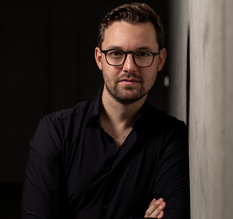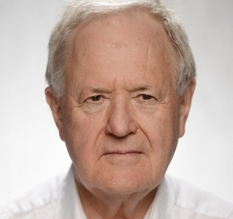


Gordon Kampe | Die Kreide im Mund des Wolfs

Musik
Gordon Kampe
Composer
Gordon Kampe was born in 1976 in Herne, where he completed an apprenticeship as an electrician (1993-1995). After graduating from high school and completing his community service, he studied composition at the Rostock University of Music and Drama from 1998-2000 with Hans-Joachim Hespos and Prof. Adriana Hölszky. From 2000-2003 he continued his studies with Prof. Nicolaus A. Huber at the Folkwang Hochschule in Essen. He also studied musicology and history at the Ruhr University in Bochum. From 2004-2006 he was a research assistant on the DFG research project “Music Theory of Viennese Modernism”. Musicological doctorate on fairytale operas in the 20th century. From 2009-2017 he was a research assistant at the Folkwang University of the Arts in Essen. His research focuses on opera and music theater, music of the 21st century and popular music theory.
Kampe is co-editor of the journal Seiltanz - Beiträge zur Musik der Gegenwart and was a member of the Junge Akademie at the Berlin-Brandenburg Academy of Sciences and Humanities/German Academy of Sciences Leopoldina from 2012-2017, of which he was spokesperson in 2015/16. In the academic year 2014/15 Gordon Kampe was deputy professor for historical musicology at the Justus Liebig University in Giessen, since 2017-2020 professor for composition/music theory at the HfMT Hamburg, since October 2020 professor for composition at the HfMT Hamburg. Member of the Freie Akademie der Künste Hamburg since 2019, President of the Gesellschaft für Neue Musik (GNM) since 2021.
More about Gordon Kampe
photo: Manuel Miethe

Text
Dieter Sperl
Text
After completing his studies in Graz, Dieter Sperl now lives in Vienna as an author of experimental and conceptual books, audio plays and text installations. He recently produced a trilogy of original audio plays for ORF, which philosophically explores the question of human identity. In addition to several book publications, including the film diary “Random Walker”, the Zen-inspired novel “Absichtslos” and the dream notes “AN SO VIELE WIE MICH”, he is the editor of the literary folder “flugschrift”. In 2022, his libretto “Playing Trump”, written for the composer Bernhard Lang, was premiered at the Hamburg Opera.
Photo: Martin Rauchenwald
photo: Martin Rauchenwald

Szen. Einrichtung
Georges Delnon
Director
Georges Delnon was born in 1958 in Zurich. He studied history and art history at the Universities of Bern and Friborg as well as composition and music theory at the Bern Conservatory. Positions as assistant director, including works with Jean-Pierre Ponnelle, Götz Friedrich and Giorgio Strehler, completed his training.
This was followed by the first opera and theater productions such as "Carmen" and "Fledermaus" at the Frankfurt Opera, "Dido" in Toulouse, "Rape of Lucretia" in Dusseldorf and Basel, "Fräulein Julie" in Essen, "La Griselda" (Vivaldi) in Geneva, "Junge Lord" (Henze), "Maria Stuart" and "Ezio" for the Händel Festival in Karlsruhe, "Schwarze Spinne" (Sutermeister), "Das Lachen der Schafe " (Demierre) and "König für einen Tag" (Grünauer) for the Lucerne Festival in Switzerland. In 1996, he took over his first artistic directon at the Theater of the City of Koblenz and became co-founder of the Koblenz fortress games. From 1999-2006, he became Artistic Director of the Staatstheater Mainz, where numerous works were created. Among other things, the reopening of the Great House was broadcasted live on 3Sat in 2001 with the staging of the opera "Saul" by G. F. Händel.
Other works as director during this period include "Il figlio delle selve" by Ignaz Holzbauer for the Schwetzinger Festspiele and the Féstival Radio France Montpellier. In addition, Georges Delnon appeared as an actor in the movie “HEIMAT 3” by Edgar Reitz.
In 2004, he directed the world premiere of Mark André, "22.13", for the Munich Biennale, the Festival d'Automne à Paris and the Opéra National de Paris. In 2005 and 2006, he staged the world premiere "Zaubern" by Frederik Zeller and the baroque opera "Proserpina" by Joseph Martin Kraus for the Schwetzinger Festspiele.
From 2006 to 2015, Georges Delnon has been director of the Theatre Basel, Switzerland's largest three-party house. Under his leadership, the theatre became Opera House of the Year in the Opernwelt Critics Survey twice, in 2009 and 2010. In 2010, he directed Giuseppe Verdi's TV production "Aida am Rhein", which was broadcasted live on Swiss television and on 3Sat.
In 2012, he directed the world premiere of Alfred Zimmerlin's music theatre "Das Licht" for the Lucerne Festival and in 2013 "Anschlag", also for the Lucerne Festival and märz musik Berlin.
From 2009 to 2016, Georges Delnon was Artistic Director of the Music Theatre of the Schwetzinger SWR Festival. The two world premieres "Proserpina" in 2009 and "Koma" in 2016 were honored in the critics' poll of the opera world as "premiere of the year".
Since 2015, he is the Artistic Director of the Hamburg State Opera and the Hamburg Philharmonic State Orchestra. Under his leadership, Alban Berg's "Lulu" is voted "Performance of the Year" in the critics' survey of the opera world in 2017, and director Christoph Marthaler receives the Faust Prize for this production. In the summer of 2018, Georges Delnon's Hamburg staging of the Zauberflöte for young people "Erzittre, feiger Bösewicht", was screened in Shanghai. In 2019 he staged the chamber opera "THERÈSE", which was premiered at the Salzburg Easter Festival and celebrated its German premiere in the Recital Hall of the Elbphilharmonie at the Hamburg International Music Festival.
photo: Peter Schnetz

Musikalische Leitung
Tim Anderson
Conductor
Birthplace:
London, England
Studies:
Music at New College, Oxford
Conducting, Guildhall School of Music and Drama
Jorma Panula Academy, Helsinki
Repertoire:
Contemporary
Ades: Powder Her Face
Barry: The Intelligence Park
Dean: Hamlet
Lang: Hiob
Sciarrino: Il canto s'attrista, perche?
Turnage: Greek
Venables: Denis and Katya
Stages:
Royal Opera House, Covent Garden, Teatro Real Madrid, Opera Australia, Semperoper Dresden, Dutch National Opera, Opéra National de Montpellier, Stadttheater Klagenfurt, Vienna’s Konzerthaus, London’s Southbank Centre and Barbican, Katowice’s NOSPR Hall, et al.
Cooperation with orchestras:
Klangforum Wien, Birmingham Contemporary Music Group, London Sinfonietta
More about Tim Anderson
photo: Jeremy Knowles

Dramaturgie
Klaus-Peter Kehr
Klaus-Peter Kehr ist ein deutscher Dramaturg, Theaterwissenschaftler und Intendant.
Nach seinem Studium an der Universität Wien war er zunächst primär als Musiktheater-Dramaturg tätig, ab 1971 an der Kölner Oper, später in Bonn. Von 1991 bis 2002 verantwortete er das Musikprogramm der Wiener Festwochen. 1994 übernahm er darüber hinaus die künstlerische Leitung des Musiktheaters der Schwetzinger SWR Festspiele, die er bis 2008 ausübte.
Eine jahrzehntelange Zusammenarbeit verbindet ihn mit dem Regisseur Achim Freyer. Neben seinen Aktivitäten an deutschen Musiktheatern lehrte er an Musik- und Theaterhochschulen, so unter anderem an der Staatlichen Akademie der bildenden Kunst in Stuttgart, an der Universität Wien, an der Folkwang Hochschule in Essen sowie an der Hochschule der Künste Berlin.
Von 2005 bis 2016 war Klaus-Peter Kehr Operndirektor am Nationaltheater Mannheim.

Solist
Georg Nigl
Baritone
Birthplace:
Vienna, Austria
Studies:
In Vienna with Kammersängerin Hilde Zadek
Prizes:
Singer of the Year (Opernwelt, 2015)
Important parts:
Wozzeck (Wozzeck), Lenz (Jakob Lenz), Orfeo (L’Orfeo), Papageno (Die Zauberflöte), Don Alfonso (Così fan tutte), Figaro (Le Nozze di Figaro), et al.
Stages:
Bayerische Staatsoper, Staatsoper Unter den Linden, Wiener Staatsoper, La Monnaie, De Nederlandse Opera, Bolschoi Theater, Staatsoper Stuttgart, Salzburger Festspiele, Festival d’Aix en Provence, Wiener Festwochen, et al.
Cooperation with directors:
Andrea Breth, Dmitri Tcherniakov, Hans Neuenfels, Frank Castorf, Claus Guth, Sascha Waltz, Romeo Castellucci, Calixto Bieito, et al.
Cooperation with conductors:
Nikolaus Harnoncourt, Daniel Barenboim, Kirill Petrenko, Valery Gergiev, Teodor Currentzis, Kent Nagano, René Jacobs, Antonello Manacorda, et al.
photo: Anita Schmid

Orchester
Philharmonisches Staatsorchester Hamburg
Orchestra
The Philharmonic State Orchestra is Hamburg’s largest and oldest orchestra, looking back on many years of musical history. When the “Philharmonic Orchestra” and the “Orchestra of the Hamburg Municipal Theatre” merged in 1934, two tradition-steeped orchestras combined. Philharmonic concerts have been performed in Hamburg since 1828, artists such as Clara Schumann, Franz Liszt and Johannes Brahms being regular guests of the Philharmonic Society. The history of the opera company goes back even further: Hamburg has been home to musical theatre since 1678, even if a regular opera or theatre orchestra was only formed later. To this day, the Philharmonic State Orchestra has embodied the sound of the Hansa City, a concert and opera orchestra in one.
During its long history, the orchestra encountered great artist personalities. Apart from composers of the 18th, 19th and 20th centuries, such as Telemann, Tchaikovsky, Strauss, Mahler, Prokofiev and Stravinsky, since the 20th century chief conductors such as Karl Muck, Joseph Keilberth, Eugen Jochum, Wolfgang Sawallisch, Horst Stein, Aldo Ceccato, Christoph von Dohnányi, Gerd Albrecht, Ingo Metzmacher and Simone Young have shaped the orchestra’s sound. Renowned conductors of the pre-war era such as Otto Klemperer, Wilhelm Furtwängler, Bruno Walter, Karl Böhm and Hans Schmidt-Isserstedt gave brilliant performances, as did outstanding conductors of our times: suffice it to mention Christian Thielemann, Semyon Bychkov, Kirill Petrenko, Adam Fischer and Sir Roger Norrington.
Starting with the 2015/2016 season, Kent Nagano has taken on the position of Hamburg’s General Music Director and Chief Conductor of the Philharmonic State Orchestra and the Hamburg State Opera and since June 2023 also its honorary conductor. In his first season Kent Nagano initiated a new project, the Philharmonic Academy, focusing on experimentation and chamber music. In 2016, Nagano and the Philharmonic toured South America, followed by concert tours to Spain and Japan in 2019, and in the spring of 2023, the Philharmonic State Orchestra made its debut at New York's Carnegie Hall under his direction, which was acclaimed by audiences and the press. Since 2017 Kent Nagano and the Philharmonic State Orchestra have continued the traditional Philharmonic Concerts at the new Elbphilharmonie, for which they commissioned Jörg Widmann to compose the oratorio ARCHE, which was given its world premiere during the hall’s opening festivities. The concert recording has been released by ECM, for which Widmann received the OPUS KLASSIK as Composer of the Year 2019, and ARCHE was performed again in 2023 to great acclaim.
The Philharmonic State Orchestra offers approximately 35 concerts per season and performs more than 240 performances per year at the Hamburg State Opera and the Hamburg Ballet John Neumeier, making it Hamburg’s busiest orchestra. The stylistic bandwidth covered by the 140 musicians, ranging from historically informed performance practice to contemporary works and including concert, opera and ballet repertoire, is unique throughout Germany. Chamber Music has a long tradition at the Philharmonic State Orchestra: what began in 1929 with a concert series for chamber orchestra has been continued since 1968 by a series of chamber music only.
In 2008 Simone Young and the Philharmonic State Orchestra won the Brahms Award of the Schleswig-Holstein Brahms Society. The orchestra has recorded the complete Ring by Wagner as well as the complete symphonies of Johannes Brahms and Anton Bruckner – the latter in the rarely-performed original versions – as well as works by Mahler, Hindemith and Berg, and has released DVDs of opera and ballet productions by Hosokawa, Offenbach, Reimann, Auerbach, J.S. Bach, Puccini, Poulenc and Weber.
The members of the Philharmonic State Orchestra feel equally beholden to Hamburg’s musical tradition and responsible for the city’s artistic future. Since 1978 the musicians have been participating in education programmes in Hamburg’s schools. Today, the orchestra maintains a broad education programme, including school and kindergarten visits, patronage for music projects, introductory events for children and family concerts. The orchestra’s own academy prepares young musicians for their professional careers. The Philharmonic’s musicians thereby make an equally enjoyable and valuable contribution to tomorrow’s music education in the music metropolis of Hamburg.
More about Philharmonisches Staatsorchester Hamburg
photo: Foto: Felix Broede

